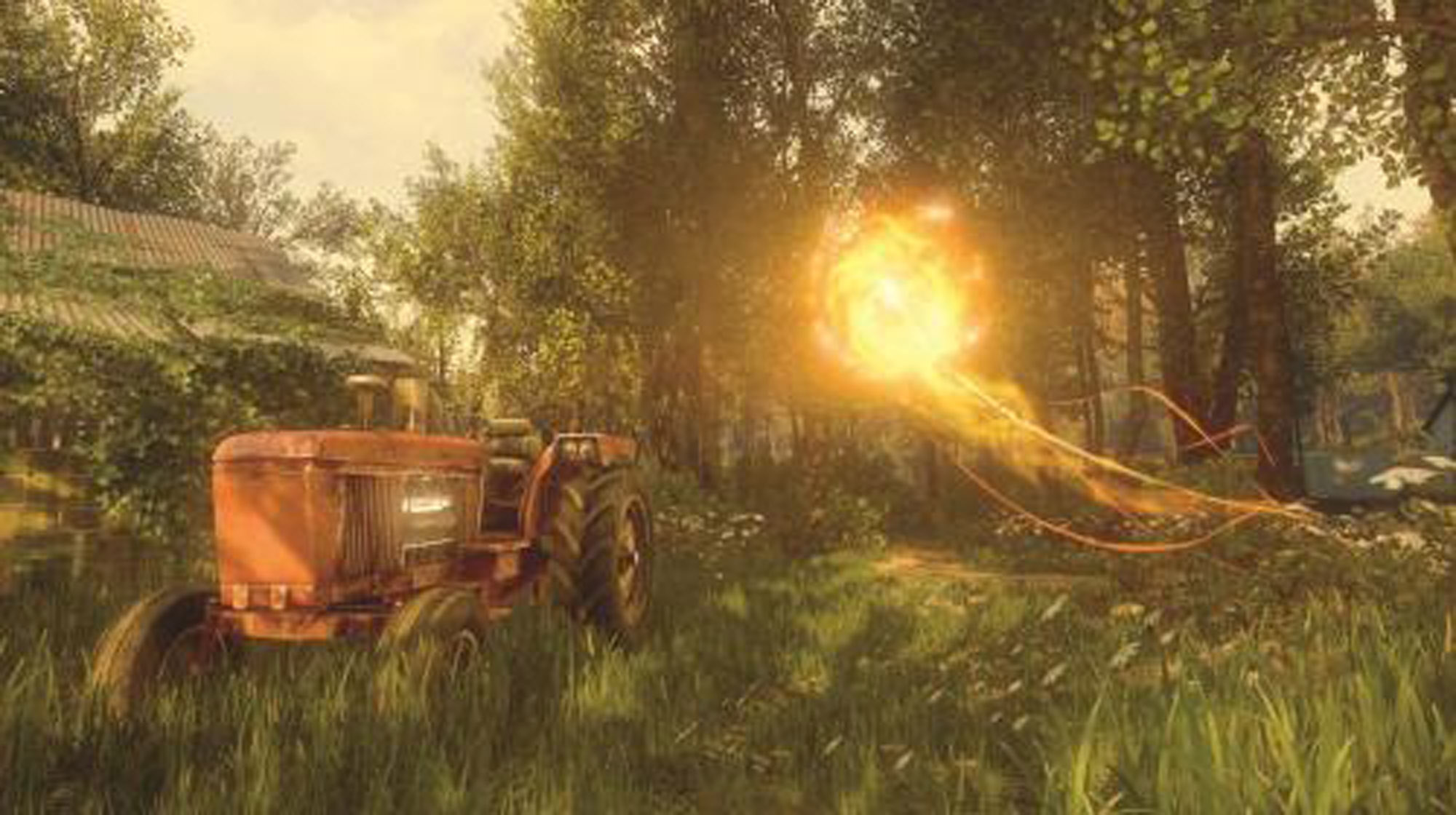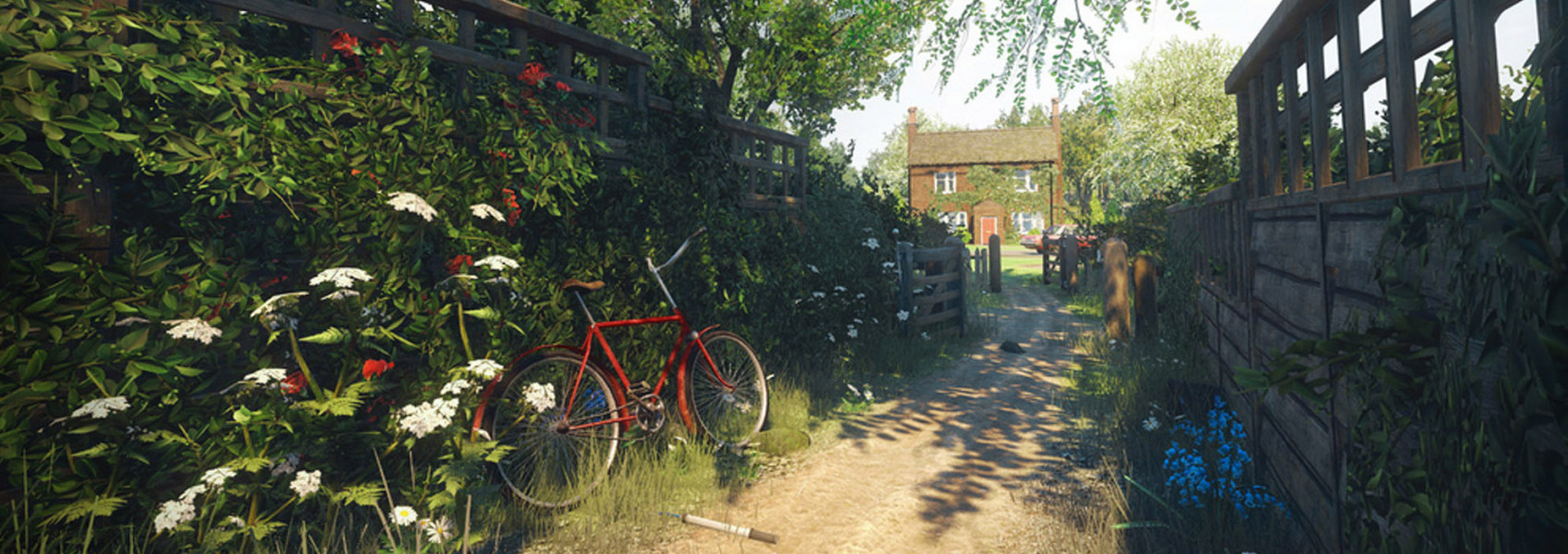This article was written by Jorge Albor and originally published on Pop Matters.
It was brought to us by our friends at Critical Distance, who find the best in critical writing about games each week. You can see more at their site, and support them on Patreon.
///
I know what I want from Everybody’s Gone to the Rapture. I want someone to be angry at.
I know, I know, it’s an inspirational story in some ways. The latest game from The Chinese Room drops you into the sleepy little hamlet of Shropshire, a quiet rural town nestled in the Yaughton valley. There we discover everyone has disappeared, leaving clues to the their story scattered about in the form of memories, light trails projecting their last moments on earth like ephemeral home recordings.
What we learn is to some extent a comfort. Jeremy, the town minister, maintains his calm and comforts the villagers even while struggling with a crisis of faith. Wendy, the curmudgeonly old busybody does really care for her friends and mends things in the end. Frank, the farmer dealing with the loss of his wife and his cowardice during her final days manages to forgive himself and find courage in the end. All around us and even with a mysterious infection literally causing people to disappear into thin air, humanity shows a strain of overwhelming goodness. At the very least, we try so hard.

Viewing these tiny moments of camaraderie or love as a wandering voyeur of sorts is an isolating experience. There are balls of glowing light that zip about the world, providing a guided tour of sorts, and these provide some companionship in the lonely remnants of Yaughton. I found myself venturing backwards during the game, trying to find the occasional missed experience, spending long moments in thought and isolation. The landscape of Rapture is gorgeous and a treat to admire, but I still found myself cheered by the reappearance of a ball of light. If it were not for these guiding companions, I would feel less like a watcher and more like an abandoned soul.
Even so, I also felt a strange discomfort with these balls of light. It is the light that infects the Shropshire villagers in the first place. The light from space causes them to hemorrhage and bleed and disappear. Kate, the scientist at the center of the story, seems increasingly drawn into the light. She sees it as a grand pattern that connects us all, a blessing in disguise. Maybe that’s true, but it is also the source of immense fear. At one point in the story, a woman’s children start to bleed from the nose. They are terrified and the woman’s husband takes them upstairs for a nap. Later, the town minister finds her in tears, too scared to go upstairs and confirm what she already knows: her family is gone.
I get the sense that I am meant to find comfort in Everybody’s Gone to the Rapture. Perhaps in this town I am meant to see aspects of myself or those I love. Perhaps I am meant to know so many of us have lived, lost, and died, just as I one day will. In that sense, Rapture reminds me of of Richard McGuire’s Here, which also layers stories on top of each other to force a connection between myself as a reader and the endless past and unforeseeable future.

Like Mcguire’s Here, memories are layered in Yaughton.
But throughout the story, I keep seeing people scared, without answers, facing their inevitable disappearance alone. Who am I meant to be in this game, poking through the ash of these fallen villagers? I hear parts of their story, but there can be no perfect recreation of their lives. I see only pieces, and I didn’t even see the conclusion to Jeremy’s story arc. As a grounded watcher in Shropshire, I feel powerless. I watch and I listen and I am helpless to provide solace to these people.
I don’t know if the light in Everybody’s Gone to the Rapture is meant to be some alien force, accidentally incorporating everyone into its collective being. Maybe the light is a force of God, some unifying symbol, and by disappearing into the whole, Jeremy, Frank, Wendy, Lizzie, and her unborn baby are all better off. But from my perspective here on earth, seeing only ash and fading memories dancing in light, it’s hard not to see the events of this story as a tragedy.
For the most part, the townspeople of Everybody’s Gone to the Rapture slip quietly away. I don’t think that I’m satisfied with this end of the world. The hardest part of loss is being so full of anger and having nowhere to put it. I want to see our last moments written in light, not to be whispered, but brazenly shouted: Here we lived and loved in bold defiance of the darkness.
///
This article was written by Jorge Albor and originally published on Pop Matters.
It was brought to us by our friends at Critical Distance, who find the best in critical writing about games each week. You can see more at their site, and support them on Patreon.
